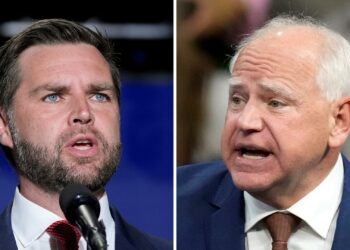You’re reading an excerpt from the WorldView newsletter. Sign up to get the rest free, including news from around the globe and interesting ideas and opinions to know, sent to your inbox on Monday, Wednesday and Friday.
The leaders of the West’s preeminent military alliance convene this week in Washington. The annual NATO summit marks the bloc’s 75th anniversary, and the heads of its member states in attendance will seek to showcase their collective resolve and strength. But looming above the deliberations is a pronounced sense of vulnerability and anxiety.
The specter of a potential return of former president Donald Trump haunts many of the United States’ European allies, and looms closer amid the growing clamor over President Biden’s capacity to win reelection. Trump repeatedly voiced his antipathy to NATO in his first term, and in the most recent debate declined to say whether he would pull the United States out of the alliance. European diplomats are already preparing contingency plans for a future Trump administration; many doubt he would actually withdraw from NATO, but are concerned about Trump weakening U.S. commitments to the alliance and undermining transatlantic unity.
Trump’s ultranationalist bluster and Biden’s demonstrated frailty during the debate sent its own message to foreign observers. “This election is doing more to discredit American democracy than [Russian President] Vladimir Putin and [Chinese President] Xi Jinping could ever hope to,” wrote Sergey Radchenko, a historian at the Johns Hopkins School of Advanced International Studies, on social media. “I am worried about the image projected to the outside world. It is not an image of leadership. It is an image of terminal decline.”
In Europe itself, national and regional elections have elevated populist, far-right factions, including some that are more hospitable to the Kremlin and skeptical of NATO — though on Sunday, exit polls in France’s legislative election appeared to show voters mobilizing to reject the right-wing, anti-immigration National Rally party. Even still, the political headwinds on both sides of the Atlantic are swirling around this week’s meetings in Washington.
GET CAUGHT UP
Stories to keep you informed
“The summit has gone from an orchestrated spectacle to one of the most anxious gatherings in modern times,” a senior Biden administration official told Washington Post columnist David Ignatius last week.
The war in Ukraine is bound to dominate the proceedings. Despite Kyiv’s insistence and the eagerness of some of its Eastern European neighbors, NATO membership for Ukraine is off the table. In its place, individual NATO states are inking significant bilateral security deals with the Ukrainians and working to accelerate transfers of weapons and military aid as Ukraine’s forces hold the line more than two years into Russia’s full-scale invasion.
Diplomats in Washington are aware that Trump may choose to cut off military support to Kyiv, which already was subject to a costly delay as some Republicans in Congress stymied necessary funding for months. They fear a scenario where a Trump White House may tacitly enable Russia to consolidate its control over illegally won territories in Ukraine, pushing for a negotiated peace before Kyiv has the upper hand in the war. That’s why both the Biden administration and some governments in Europe have desperately tried to “Trump-proof” support for Ukraine in the near to medium term.
“With Trump’s possible return looming, the best way to ensure Ukraine’s long-term security is to give Ukraine more capability to actually defeat Russia,” my colleague Josh Rogin noted. “That means speeding up delivery of air-defense systems, fighter planes, longer-range rockets, and helping Ukraine develop its own defense production to reduce its dependence on the West.”
At last year’s NATO summit in Lithuania, Ukrainian frustrations over not receiving a formal invitation into the alliance boiled over into public view and threw the meetings into chaos. Similar tensions may not be on show this week, but some of Ukraine’s boosters in Washington believe Biden ought to do more.
“We have a political window right now that should allow for more acceptance of NATO accession,” Dan Runde, senior vice president of the Center for Strategic and International Studies, told me. “This should be the time that the Biden administration should push” for Ukraine’s NATO bid, added Runde, who served under President George W. Bush and pointed to Bush’s attempts to encourage membership for Ukraine and Georgia in 2008 that were not, at the time, matched by many of the United States’ European counterparts.
Absent clear commitments to Ukraine, NATO officials have opted to focus on the big picture. “The United States is home to a quarter of the world’s economy, but combined, NATO allies have half of the world’s economy and half its military might,” outgoing NATO Secretary General Jens Stoltenberg wrote in Foreign Affairs. “Together, our deterrence is more credible, our support to Ukraine is more constant, and our cooperation with outside partners is more effective.”
Stoltenberg’s designated successor — former Dutch prime minister Mark Rutte — is positioning himself as a clear-eyed leader of the alliance and has already urged European colleagues to adjust to whatever political dispensation takes hold in Washington after November. “We should stop moaning and whining and nagging about Trump,” Rutte said at a security conference earlier this year. “I’m not an American; I cannot vote in the U.S. We have to work with whoever is on the dance floor.”
But the background music is getting grim. New polling by the European Council on Foreign Relations of 15 European countries, including Ukraine, found a growing disconnect between Ukrainians and the European public elsewhere. When asked how the war will end, close to 60 percent of Ukrainians said they see outright victory for their nation, while only 30 percent believed it would end in some form of diplomatic settlement. If boosted by a new increases in Western arms, that Ukrainian belief in complete victory, according to the pollsters, only grows.
That enthusiasm is not shared by many other Europeans, who overwhelmingly reject sending ground forces to help the Ukrainians and doubt Kyiv’s ability to actually win the war. “The prevailing view in most countries … is that the conflict will conclude with a compromise settlement,” noted the ECFR report’s authors, Ivan Krastev and Mark Leonard. “So, when it comes to the war’s end, European publics express the pessimism of the intellect while Ukrainians represent the optimism of political will.”
Source link : https://www.washingtonpost.com/world/2024/07/08/nato-summit-far-right-trump-france/
Author :
Publish date : 2024-07-08 01:31:12
Copyright for syndicated content belongs to the linked Source.





